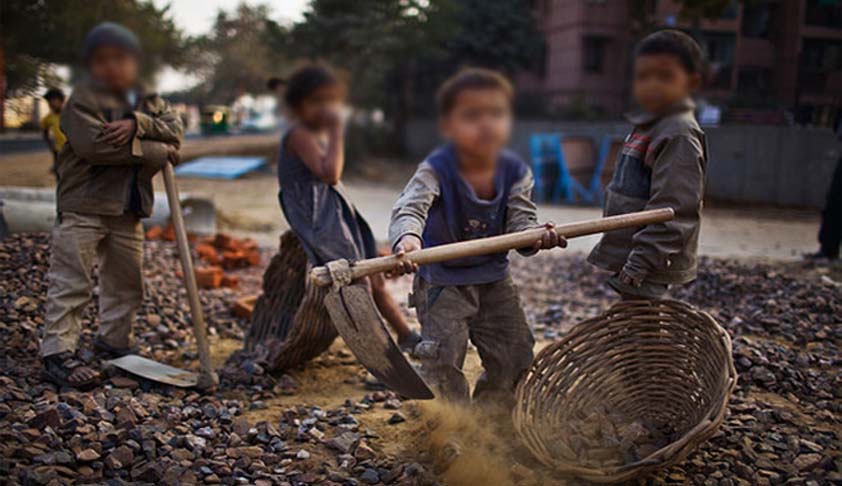Liability regime for children
Prof. Faizan Musthafa
6 Aug 2016 1:37 PM IST

The promise of “acchhe din” may or may not have come true for the adult citizens of India but as far as our children, particularly adolescents between 14 and 18 are concerned, these two years have been disappointing. From UPA’s rights and entitlement regime, which gave them the right to education and right to food, we now have a dispensation which probably believes in imposing liability and does not favourably look at rights and freedom. It seems the government wants to promote the theory that the only right citizens have is the right to do their duty.
On the one hand, the policies and laws enacted by the government are nothing short of a rough deal for the children and, on the other, they have devastating consequences for adolescents. There is a move to fail children as the automatic promotion scheme is going to be abandoned soon under the new education policy.
These disturbing developments demonstrate a regressive thinking and are not in tune with the latest researches in child psychology. After passing the juvenile justice law in December, 2015 which permits trial of even juveniles in adult courts, we now have a law which would have the effect of legitimising and perpetuating child labour. What does the Constitution say about children? Article 15 empowers the state to enact laws to protect children. Article 39(f) mandates the state to direct its policy to ensure that children are given opportunities and facilities to develop in a healthy manner and in conditions of freedom and dignity and that childhood and youth are protected against exploitation and against moral and material abandonment.
Similarly, Article 45 says the state shall endeavour to provide early childhood care and education and Article 47 imposes a duty on the state to raise the level of nutrition and standard of living. Successive governments have not cared about most of these constitutional obligations and even the right to education bill could be passed only in 2009. For decades, activists have been demanding that any child, who is not enrolled in a school, should be treated as child labour. In spite of India being a signatory to the International Convention on the Rights of the Child, we are continuously violating its provisions. Our law merely prohibits employment of children below 14 only in what are termed ‘hazardous industries’. As many as 83 employments are hazardous as of today but the new law takes as many as 80 employments out of this prohibited list and retains only three as hazardous. Thus, the government has paved the way for the employment of adolescents in as many as 80 hazardous employments. The vital distinction between children and adults has been completely overlooked by this law. Non-recognition of this distinction is not only irrational but arbitrary and a clear violation of right to equality. It is a case of unlikes being treated alike which the Constitution prohibits.
Moreover, the law is not only grossly unfair to adolescents, even children below 14 have not been spared as it does permit their employment in what it terms ‘non-hazardous family enterprises’. The small window of consolation is these children can be employed only after school hours or during holidays. The family has been defined in the broadest possible terms to include even uncles, aunties, nephews and nieces and if any member of the family is engaged in any enterprise, it would be considered ‘family enterprise’ where children below 14 can be lawfully made to work. The law shows poor understanding of our school education system under which students have to carry heavy bags and are under tremendous pressure to meet the course requirements and never-ending deadlines. Indian children return from schools completely exhausted and totally tired with a lot of homework. Asking these children to further sweat in the so-called family enterprises is not only inhuman but also disgusting. Is this not legalising rather than prohibiting child labour as most children indeed work in so-called family enterprises? Three out of four child labourers in the country work in agriculture or household industries.
We should be ashamed that 4.35 million children between the age of 5 and 14 are in employment as per the last census. If at all we want some family arts or professions to be learnt by the generation next, then the better option is to include these skills in our vocational education or integrate them with our art and craft courses so that all children learn these skills and this so-called outdated caste-based profession thing ends in a few decades. Similarly, the Modi government passed the juvenile justice law last year punishing adolescent juveniles as adults and sending them to prisons. Recently, in an accident matter too, the juvenile board recommended the trial of the adolescent in the adult court. No one noticed that this was not even a heinous crime. The Congress is as guilty as the BJP. Only CPI (M) and DMK members showed some understanding of juvenile delinquency in the parliamentary debates. Moreover, there is contradiction in the title of the Bill and what it provides for.
While the law is titled the Juvenile Justice (Care and Protection of Children) Amendment Bill 2015, it basically takes away their rights under the Constitution and United Nations Convention on the Rights of Child, 1992. It is disgusting to note that the explicit provisions of the Bill clearly go against its preamble which says the Bill is intended to protect children in their best interests.
The Bill achieves the exact opposite. Is it not legislative dishonesty, whereby a law intended to protect children, in reality, takes away their rights? The child labour law too follows the same strategy and in the name of banning child labour, it basically legitimises it. God help our children.
 Prof. Faizan Mustafa is Vice-Chancellor, NALSAR University of Law.
Prof. Faizan Mustafa is Vice-Chancellor, NALSAR University of Law.
This Article is first published in The New Indian Express. LiveLaw republishes it with the permission of the Author.
The opinions expressed in this article are the personal opinions of the authors. The facts and opinions appearing in the article do not reflect the views of LiveLaw and LiveLaw does not assume any responsibility or liability for the same.


